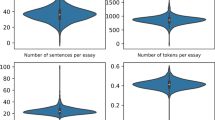Abstract
We investigated linguistic factors that relate to misalignment between students’ and teachers’ ratings of essay quality. Students (n = 126) wrote essays and rated the quality of their work. Teachers then provided their own ratings of the essays. Results revealed that students who were less accurate in their self-assessments produced essays that were more causal, contained less meaningful words, and had less argument overlap between sentences.
Access this chapter
Tax calculation will be finalised at checkout
Purchases are for personal use only
Preview
Unable to display preview. Download preview PDF.
Similar content being viewed by others
References
Varner, L.K., Roscoe, R.D., McNamara, D.S.: Evaluative Misalignment of 10th-Grade Student and Teacher Criteria for Essay Quality: An Automated Textual Analysis. Journal of Writing Research 5, 35–59 (2013)
Dunlosky, J., Ariel, R.: Self-Regulated Learning and the Allocation of Study Time. In: Ross, B. (Ed.) Psychology of Learning and Motivation, pp. 103–140 (2011)
Kos, R., Maslowski, C.: Second Graders’ Perceptions of What is Important in Writing. The Elementary School Journal 101, 567–585 (2001)
McNamara, D.S., Graesser, A.C., McCarthy, P.M., Cai, Z.: Automated Evaluation of Text and Discourse with Coh-Metrix. Cambridge University Press, Cambridge (2014)
Kyle, K., Crossley, S.A.: Automatically Assessing Lexical Sophistication: Indices, Tools, Findings, and Application. TESOL Quarterly (in press)
Crossley, S.A., Kyle, K., McNamara, D.S.: Automatic Assessment of Local and Global Cohesion: Implications for Text Comprehension, Coherence, and Quality. Discourse Processes (under review)
McNamara, D.S., Crossley, S.A., Roscoe, R.D., Allen, L.K., Dai, J.: Natural Language Processing in a Writing Strategy Tutoring System: Hierarchical Classification Approach to Automated Essay Scoring. Assessing Writing 23, 35–59 (2015)
Author information
Authors and Affiliations
Corresponding author
Editor information
Editors and Affiliations
Rights and permissions
Copyright information
© 2015 Springer International Publishing Switzerland
About this paper
Cite this paper
Allen, L.K., Crossley, S.A., McNamara, D.S. (2015). Predicting Misalignment Between Teachers’ and Students’ Essay Scores Using Natural Language Processing Tools. In: Conati, C., Heffernan, N., Mitrovic, A., Verdejo, M. (eds) Artificial Intelligence in Education. AIED 2015. Lecture Notes in Computer Science(), vol 9112. Springer, Cham. https://doi.org/10.1007/978-3-319-19773-9_54
Download citation
DOI: https://doi.org/10.1007/978-3-319-19773-9_54
Published:
Publisher Name: Springer, Cham
Print ISBN: 978-3-319-19772-2
Online ISBN: 978-3-319-19773-9
eBook Packages: Computer ScienceComputer Science (R0)




